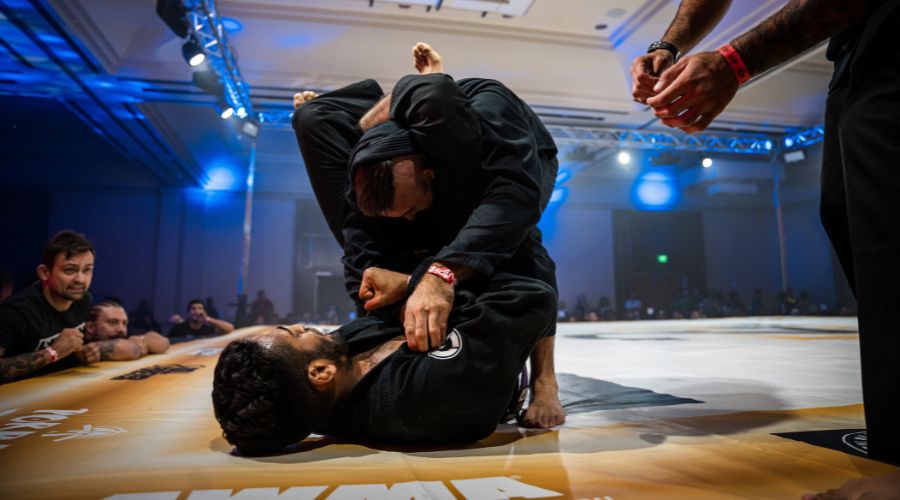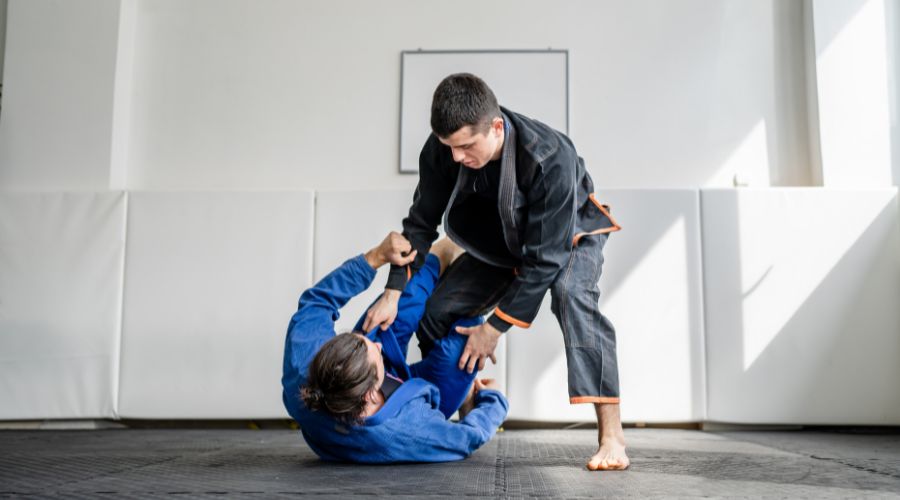Brazilian jiu-jitsu is thriving in no small part thanks to its highly competitive nature. Tournaments are a vital part of it, and the nature of BJJ and the competition structure are welcoming to all kinds of people. Almost every practitioner has thought of competition, but you’re likely wondering: How long should I train before competing?
A universal timeline or a particular skill set is not required before competing. But for most people, the recommended time is between 6 months and a year to give you enough time to get familiar with all the major positions and have at least some competencies offensively and defensively in each.
Deciding to enter a competition is admirable, and there is no recipe or an exact right time to do it. But certain clues can help you determine whether you are ready or not.
How Long Should You Train Before Competing In BJJ
There are a lot of variables that determine when you are ready to compete. For most people, the period of 6 months to a year of consistent training is enough to familiarize themselves with the basic positions, which are closed guard, open guard, side control, mount, and back control, and have reliable ways to secure them and escape when on the bottom. I believe this is the bare minimum for entering a tournament.
The time this takes depends a lot on the person. For someone with no athletic background, the period will undoubtedly be closer to a year or even more because they must also build the necessary physical qualities and specific skills.
More athletic types will need less time. If the background is martial arts, things become even better. In my case, I had a lot of years of striking experience with a few competitions. I was already in good shape and knew what to expect mentally, so I entered a competition with only 3 months of jiu-jitsu training.
Other grapplers, like wrestlers and judokas, can transition even faster.
Your coaches are the best people who can help you decide whether or not you are ready to compete. Ultimately, the decision is yours, but the instructors have a much more realistic outlook about your skill level and progress. In all stages of your journey, consult and listen to your coaches. They have much more experience than you.
Another factor that will give you a good representation of whether you are ready for competition will be your sparring success. More experienced people will smash you, so the important metric is how well you deal with people at your level and weight because your eventual competitors will be like them. Open mats are a great way to gauge this.
Why BJJ Competitions Are Valuable

But why even bother to experience the awful anxiety and risk of bodily harm and compete?
Competing in BJJ is one of the most rewarding experiences you can have. It will not only help you hone your skills, but it’s an invaluable mental experience.
Competing brings the highest intensity outside a real-life confrontation, regardless of how hard you roll or train. In competition, you get the most honest and realistic feedback on both your physical skills and mental resilience.
Jiu-jitsu is much safer than other combat sports, especially when compared to full-contact striking, which makes competitions accessible to a lot more people.
The sport’s relative safety means you are risking more of your ego than your physical health, and the repercussions of going in underprepared are not so dire, which is why some enter their first tournaments with little training.
Another well-thought-out element of BJJ tournaments is the belt ranking, experience level, and division, which ensure you will meet someone of comparable skill. Yes, there is a solid chance they will be much better than you, but chances are you will be close in skill.
Despite the relatively low risk of BJJ competition, most of us prefer not to go and get instantly smashed, so there is a certain level of preparation I strongly advise you to undertake before entering your first tournament.
How Much Should You Train Before A BJJ Competition
The more intentional training you can put in, the better you will be. You cannot control the outcome of your matches, but you can put in the effort and do your best.
Professional-level fighters train six times per week, twice daily, but for a white belt, this is not plausible both as an effort and a time investment. But 3–4 times per week should be a minimum if you want to feel at least confident you are training enough. Ideally, this should be complemented with some strength and conditioning work twice weekly.
The typical timeframe for competition preparation is 6 to 8 weeks, during which the training intensity should also be increased. While flow rolling is great, in preparation for a tournament, you need competition rounds at maximum intensity to know how it feels and not get overwhelmed in the first minute of the match.
Having a game plan is also important for competition. There is no room for experimentation in an actual match, and you must bring your A-game. Devising a game plan can be done alone or, better yet, with the help of your coaches.
The most common structure of a game plan includes a top game and a bottom game with escapes from bad positions connected to the first two parts. Include only the techniques you are most proficient with. Then, when you spar, stick to the game plan and see how it works.
When Should I Stop Training Before A BJJ Tournament

The whole buildup to a tournament can be nerve-racking, and you can feel like you’ve never trained quite enough. But going full force until the last day is a mistake, and the last week before competing should be structured differently than the rest of the training camp.
This doesn’t mean stopping to train completely, but the intensity must decrease to let the body recover and be in optimal condition when it matters most.
As important as hard sparring is to sharpen the mind and body, it has no place in the competition week. Instead, lightly drill the techniques in your game plan and do light strength training and cardio work.
Light technical drilling doubles up as a great last-minute tune-up and a way to keep the mind quiet. By far, the pre-competition nerves are the worst part of competing (but also the most beneficial for mental fortitude), and light exercise helps tone them down.
The only day you should take a complete rest should be the last day before a competition, but even this is not written in stone, as many people perform better the next day after a light workout than after a complete rest. Many of these things will inevitably be trial and error, as no single recipe works for everyone.
The most important part is to enjoy the process. Every aspect of the whole experience has tremendous value, and even when things are overwhelming, try to remember it’s all worth it.
Summary
Many beginners wonder how long they need to train before they can enter a BJJ competition. There is no definitive answer because it depends on the person’s physical level, prior martial arts experience, and level of dedication.
Most people are ready to tackle other people of their level in somewhere between 6 months and a year. You can enter sooner or later, but the average timeframe is this. It’s up to you to follow it or break the “rules.”
